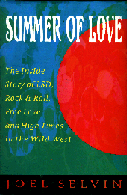The Summer of Love...
Book Review: The Summer of Love...
Author: Joel Selvin
Title: The Summer of Love: The inside Story of LSD, Rock and Roll...(1994)
Publisher: Dutton
Price: 22.95 (hard cover)
 A few weeks ago, some Deadheads brought this book to my attention through a posting on their newsgroup. I have since read it and here's what I think. First of all, I hate it when an author names a book after something the book isn't about. The first sentence in the book reads, "The Summer of Love never really happened". While I agree that the Summer of Love may not be the correct label for the events that happened in the Haight-Ashbury during the summer of 1967, the thing that gripes me is the author didn't even cover the events that happened that summer. That summer was just as an important part of our history as every other time period in the history of the Haight-Ashbury.
A few weeks ago, some Deadheads brought this book to my attention through a posting on their newsgroup. I have since read it and here's what I think. First of all, I hate it when an author names a book after something the book isn't about. The first sentence in the book reads, "The Summer of Love never really happened". While I agree that the Summer of Love may not be the correct label for the events that happened in the Haight-Ashbury during the summer of 1967, the thing that gripes me is the author didn't even cover the events that happened that summer. That summer was just as an important part of our history as every other time period in the history of the Haight-Ashbury.
The book focuses on the San Francisco rock bands more than the rest of the history of the Haight-Ashbury itself. It does contain new information about the Grateful Dead that I hadn't read in any other book about the Grateful Dead or the Haight-Ashbury. Pigpen fans will welcome all the material on him. When this information is combined with that of other books, one gets a more complete picture of what happened in the Haight-Ashbury.
I found a couple of serious mistakes concerning the history of the Haight-Ashbury in this book. First, it refers to DMT as "working man's acid," (he probably swiped that from Workingman's Dead) when the actual expression was "business man's trip." Another serious flaw has to do with the Fillmore Acid Test, where the author claims that Kesey took a microphone and exclaimed, "If I were a cop and came in here, I wouldn't know where to begin." What actually happened was Kesey was doing a running commentary on the events of the night and he asks Paul Krassner what he thought about it and he's the one who actually said those famous words. Although some of the information about the Charlatans did not jive with information in other books, I'll have to give the benefit of the doubt to the author on that one, because there must be a hundred stories circulating around on that one.
In conclusion, most Deadheads will probably want to read this book. One thing in its favor is it has a good index, so you can quickly find material on the person, band or event you're most interested in. It covers a time period from around 1965 to 1971. Although it has some mistakes, it does seem to have some new information not contained in other books which seems to be well researched. My two favorite books about the Haight-Ashbury era, however, continue to be The Electric Kool-Aid Acid Test by Tom Wolfe and The Haight-Ashbury: A History by Charles Parry. What are your favorites?

Copyright © 1995, 1996,
Colin Pringle
lovebook.htm
 A few weeks ago, some Deadheads brought this book to my attention through a posting on their newsgroup. I have since read it and here's what I think. First of all, I hate it when an author names a book after something the book isn't about. The first sentence in the book reads, "The Summer of Love never really happened". While I agree that the Summer of Love may not be the correct label for the events that happened in the Haight-Ashbury during the summer of 1967, the thing that gripes me is the author didn't even cover the events that happened that summer. That summer was just as an important part of our history as every other time period in the history of the Haight-Ashbury.
A few weeks ago, some Deadheads brought this book to my attention through a posting on their newsgroup. I have since read it and here's what I think. First of all, I hate it when an author names a book after something the book isn't about. The first sentence in the book reads, "The Summer of Love never really happened". While I agree that the Summer of Love may not be the correct label for the events that happened in the Haight-Ashbury during the summer of 1967, the thing that gripes me is the author didn't even cover the events that happened that summer. That summer was just as an important part of our history as every other time period in the history of the Haight-Ashbury.